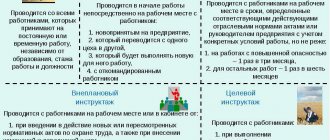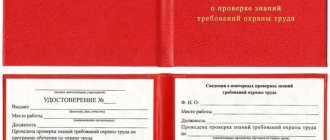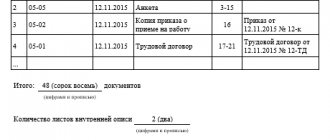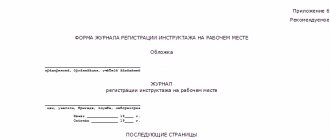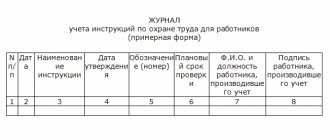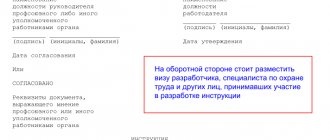The storage periods for occupational safety and health documents have been radically revised. The new rules must be applied from February 21, 2020. If you destroy documents ahead of schedule, then government agencies will consider that the documents were not completed, or they will prosecute you under Article 13.20 of the Administrative Code.
| Document type | Shelf life | Basis according to the List, approved. by order of Rosarkhiv dated 12/20/2019 No. 236 |
| General documents | ||
| Collective agreements | Constantly Sent for information - until the need has passed | Item 386 |
| General, interregional, regional, sectoral (intersectoral), territorial and other agreements | Constantly | Item 385 |
| Orders , orders; documents (certificates, summaries, information, reports) to them: | Clause 19 | |
| · according to the main (core) activity | Constantly Sent for information - until the need has passed In organizations that do not complete state and municipal archives - until the liquidation of the organization | |
| on administrative and economic issues | 5 years | |
| Documents (certificates, reports, reports, correspondence) on the implementation of orders, instructions | 5 years Then the document can be selected for permanent storage based on the results of an examination of their value | Point 21 |
| Documents on the special assessment of working conditions (regulations, protocols, decisions, proposals, conclusions, report on the special assessment, cards of the special assessment of working conditions): | Paragraph 407 | |
| at the venue | 45 years In harmful and dangerous working conditions - 75 years if completed before January 1, 2003, 50 years - if after January 1, 2003 | |
| in other organizations | 5 years after certificate expiration | |
| Rules, instructions, regulations: | Clause 8 | |
| at the place of approval | Constantly | |
| in other organizations | 1 year after replacement with new ones | |
| Primary statistical data (reports) on the activities of the respondent, submitted to the subject of official statistical accounting: | Item 335 | |
| annual and more frequently, one-time | Constantly | |
| semi-annual, quarterly | 5 years, in the absence of annual ones – permanently | |
| period | 3 years, in the absence of annual, semi-annual and quarterly - permanently | |
| ten-day, weekly | 1 year | |
| Certificates of conformity of work on labor protection (safety certificates) | 5 years after the certificate expires | Item 408 |
| Correspondence on labor protection issues | 5 years | Item 430 |
Harmful working conditions
Lists of work with harmful, dangerous working conditions, during which the employment of persons under 18 years of age and women is prohibited: Point 410 at the place of approval Constantly in other organizations Until replaced by new Lists of workers in production with harmful, dangerous working conditions 75 years , if office work was completed before January 1, 2003, 50 years - if after January 1, 2003 Clause 414 Timesheets (schedules), working time logs 5 yearsIn harmful and dangerous working conditions - 75 years if completed before January 1, 2003, 50 years - if after January 1, 2003
Paragraph 402 Documents (applications, memos, certificates, information) on the transfer of employees to a shortened working day or a shortened working week 5 yearsIn harmful and dangerous working conditions - 75 years if completed before January 1, 2003, 50 years - if after January 1, 2003
Clause 392 Work permits for work in places where harmful and dangerous production factors are present; to perform particularly dangerous and harmful work 1 yearafter the closure of the work permit
In case of industrial injuries, accidents and accidents at work - 45 years
Item 415 Logbook for issuing permits for work in places where harmful and dangerous production factors are present; to perform particularly dangerous and harmful work 1 yearafter the approval orders are closed
In case of industrial injuries, accidents and accidents at work - 45 years
Item 416How to properly prepare a journal for issuing occupational safety certificates
The form of such a journal is not regulated by law, so it can be issued in the form of an ordinary A4 book printed in a printing house (taking into account Article 10 of the Law “On Accounting” dated December 6, 2011 No. 402-FZ, GOST R 7.0.8‑2013).
All columns in the journal must be filled in; missing lines and blots are unacceptable. Corrections can be made in the usual way in office work - by crossing out and writing the correct inscription next to it, certified by the signature of the employee responsible for maintaining the journal.
Before you start filling out, all pages of the magazine must be numbered, starting with the title, and stitched. The title page indicates the name of the enterprise, the start and end dates of its operation.
Inside the magazine is laid out in such a way that it is possible to indicate:
- date of issue of the certificate;
- number;
- Full name of the employee to whom the certificate is issued;
- job title;
- place of work (structural unit, department);
- notes.
Occupational safety training
Documents (programs, lists, correspondence) for training workers in labor protection 5 years Clause 421 Protocols of training results in labor protection 5 years Clause 422 Journals, accounting books: Clause 423 · briefing on labor protection (introductory and in the workplace) 45 years · preventive work on labor protection, testing knowledge on labor protection 5 years Schedules for certification, qualification exams 1 year Clause 490List of required occupational safety magazines at the enterprise
OHS logs are used to systematize the necessary information, exercise operational control in the field of OHS at the enterprise and record information on compliance with deadlines for mandatory personnel briefings.
The list of occupational safety magazines that an enterprise must have depends on the specifics of its business activities, as well as which specialists are involved in the production process. However, there are also such registers, the presence of which is mandatory in any organization.
These are the logs:
- Registrations:
- Introductory training in occupational safety - in accordance with Art. 212, 225 of the Labor Code of the Russian Federation and the Training Procedure, approved. joint resolution of the Ministry of Labor and the Ministry of Education dated January 13, 2003 No. 1/29, contains information about the newly hired employees with whom the training was conducted, the instructor (indicating positions), the date of the training, and each entry is certified by the signatures of the instructor and the person being instructed. The log form is given in Appendix A4 to GOST 12.0.004-2015.
- Primary (repeated, unscheduled, etc.) instruction on occupational safety in the workplace - in accordance with Art. 225 of the Labor Code and the named Procedure, contains information about employees who have undergone training organized by the immediate supervisor of the unit. The instruction ends with an oral knowledge test. Upon completion of the briefing, a note is made in the journal indicating that permission to work independently is granted.
- Accidents at work - the form of this register under No. 9 was approved by the Ministry of Labor Decree “On approval of document forms...” dated October 24, 2002 No. 73. Here, the occupational safety service specialist enters information about accidents that occurred at the enterprise after conducting an internal audit for each of them.
- Fire safety introductory training - information is entered into this log based on the results of the training conducted with all hired employees. Maintenance is entrusted to a specialist responsible for fire safety at the enterprise.
- Accounting:
- OT instructions. It is recommended that specialists tasked with maintaining this register assign each OT instruction its own unique number; the name should indicate the service for which the instruction was created. When developing a journal, you can take as a basis the form from Appendix No. 9 to the methodological recommendations, approved. Resolution of the Ministry of Labor dated December 17, 2002 No. 80.
- Issuing safety instructions to employees - this register is necessary to record all facts of issuing safety instructions to employees for review. It is recommended to use the form from Appendix No. 10 to the methodological recommendations mentioned above as a sample.
- Occupational safety training - this reflects the facts of periodic training (the attendance at such events, the volume and content of information communicated to employees are recorded).
- Assignment of group I in electrical safety to personnel not involved in the maintenance of electrical equipment, which records the results of completing the appropriate training. Filling out such a log is usually assigned to an employee who has the 3rd electrical safety group. Admission groups to work with electrical equipment are specified in Appendix No. 1 to the labor protection rules, approved. by order of the Ministry of Labor dated July 24, 2013 No. 328n.
- Testing knowledge on electrical safety - it is needed to record the results of inspections of electrical personnel. The form from Appendix No. 6 to the rules, approved, is used as a sample. by order of the Ministry of Labor dated July 24, 2013 No. 328n (hereinafter referred to as the Rules).
- Primary fire extinguishing means - it displays information about the inspection of fire extinguishing means.
- Inspections by supervisory and regulatory authorities for compliance with occupational safety standards. As a standard form, it is recommended to use the form from Appendix No. 4 to the order of the Ministry of Economic Development “On the implementation of provisions...” dated April 30, 2009 No. 141.
- In some regions the list is expanding. For example, in the Amur region it is additionally required to maintain logs of the 1st and 2nd stages of monitoring working conditions at the enterprise. We are talking about a three-stage control carried out by recording data in the appropriate register, which displays information about the daily (weekly) inspection of workplaces in order to identify shortcomings in the occupational safety system at the enterprise. The 3rd stage is formalized by a special act, which is drawn up by the labor protection commission operating at the enterprise (Resolution of the Government of the Amur Region dated 06.06.2009 No. 244).
In accordance with the specifics of production processes, enterprises can also use logs:
- Accounting:
- Work according to orders and permits when working with electrical installations. It is used to display information on work carried out by specialists who have the appropriate rank and have undergone special instructions and knowledge testing. When compiling the journal, it is recommended to take the form from Appendix No. 8 to the Rules as a basis.
- Medical examinations of drivers before flights. The register records information based on the results of medical examinations of drivers, based on the form presented in clause 5 of Appendix No. 9 to the order of the USSR Ministry of Health “On improving the medical examination system...” dated September 29, 1989 No. 555.
- Issuance and maintenance of PPE (personal protective equipment). The recommended form of the journal is presented in Appendix No. 1 to the instructions, approved. by order of the Ministry of Energy dated June 30, 2003 No. 261.
- Maintenance and repair work on real estate.
- Registrations:
- permits to perform high-risk work;
- PPE testing;
- occupational diseases;
- hot work.
The organization of labor protection is not limited to the preparation of a full set of occupational safety logs. This is a complex and time-consuming process designed to ensure compliance with all occupational safety regulations. Guide ConsultantPlus will allow you to avoid missing anything and thereby avoid fines for violating the law. Using free trial access, even those who do not yet have access to the system can familiarize themselves with the material.
Body check
Lists of harmful, hazardous production factors and work, during which mandatory preliminary and periodic medical examinations (examinations) are carried out: Point 411 at the place of development and approval Constantly in other organizations Until replaced by new ones Documents (procedures, recommendations, psychophysiological requirements) on diagnostics (examination ) professional suitability of employees: Clause 412 at the place of approval Continuously in other organizations Until replacement with new ones Protocols, conclusions of psychophysiological examinations of workers 5 years if completed with office work before January 1, 2003, 50 years - if after January 1, 2003 Clause 413What is the shelf life of the induction training log - PPE, standards, instructions?
The storage period for occupational safety documents depends on the importance of the information contained in them. In this article we will talk about the law that determines the storage period for labor protection documents and the duration of these periods.
Who sets the retention periods for occupational safety documents?
When documents may not be stored
Results
Rules for filling out the workplace briefing log
On the cover (title page) of the magazine it is indicated:
- name of company;
- name of the unit (workshop, site, service, department, laboratory);
- start and end dates of logging.
Since several types of instruction are carried out at the workplace, it is permissible to divide the magazine into pages. For example:
1-10 – initial briefing at the workplace; 11-30- internship; 31-50 - repeated instructions; 51-60 - unscheduled briefing; 61-65 - targeted instruction.
An entry in the journal is made by the person who conducted the instruction. Entries should be in chronological order.
Initial briefing
Carried out before the start of its production activities:
- with all newly hired employees of the organization, including employees performing work under the terms of an employment contract concluded for a period of up to two months or for the period of seasonal work, in their free time from their main job (part-time workers), as well as at home (homeworkers) using materials, tools and mechanisms provided by the employer or purchased by them at their own expense;
- with employees of the organization transferred in accordance with the established procedure from another structural unit, or employees who are entrusted with performing work that is new to them;
- with seconded employees of third-party organizations;
- with students and students of educational institutions of relevant levels undergoing practical training (practical classes), and other persons participating in the production activities of the organization.
Initial briefing at the workplace is carried out by immediate supervisors according to programs developed and approved in accordance with the established procedure in accordance with the requirements of legislative and other regulatory legal acts on labor protection, local regulations of the organization, instructions on labor protection, technical and operational documentation. Therefore, in column 6 a reference is made to them, and also in this column a conclusion is made: the instructions have been learned, the employee is allowed to work or undergo an internship. If he does not need an internship, a “no internship” entry is made. If necessary, an internship supervisor is appointed (from among experienced workers with at least 3 years of work experience).
Source: https://rossiz.ru/kakoy-srok-hraneniya-zhurnala-vvodnogo-instruktazha/
Distribution of PPE and milk
Standards for the provision of personal protective equipment, washing and neutralizing agents, milk and other equivalent food products, therapeutic and preventive nutrition: Point 426 at the place of preparation and approval Constantly in other organizations 3 years after replacement with new ones Documents (memos, acts, conclusions, correspondence) on providing workers and employees with personal protective equipment, flushing and disinfectants, milk and other equivalent food products, therapeutic and preventive nutrition 3 yearsIn the absence of other documents on harmful and dangerous working conditions, acts and conclusions - 75 years if completed before January 1, 2003, 50 years - if after January 1, 2003
Paragraph 427 Lists (statements) for the issuance of personal protective equipment, flushing and neutralizing agents, milk and other equivalent food products, therapeutic and preventive nutrition 1 year Paragraph 428Injuries and occupational diseases
Documents (conclusions, certificates, information) on the causes of illness among employees of organizations 5 yearsThen the document can be selected for permanent storage based on the results of an examination of their value
Clause 418 Documents (acts, protocols, conclusions, information, certificates, correspondence) on the investigation and recording of occupational diseases 75 years if completed before January 1, 2003, 50 years - if after January 1, 2003 Clause 419 Voluntary insurance contracts for employees accidents at work and occupational diseases 5 years after the expiration of the contract,after termination of obligations under the contract
Clause 420 Documents (acts, conclusions, reports, protocols, certificates, sketches, diagrams, photos and video documents, extracts from labor safety briefing logs) on industrial injuries, accidents and accidents at work: Clause 425 at the place of compilation 45 yearsAssociated with major property damage and loss of life – Constant
in other organizations 5 years Books, log books, databases of industrial accidents, accident records 45 years Paragraph 424Rules for filling out the OT magazine, how to lace the magazine
Until 03/01/2017, maintaining and, accordingly, filling out occupational safety journals at enterprises was carried out according to the GOST 12.0.004-90 standard. Now the procedure for maintaining occupational safety logs is used, adjusted to meet the requirements of GOST 12.0.004-2015 (Order of Rosstandart “On putting into effect...” dated 06/09/2016 No. 600-st).
All pages in the OT magazine must be numbered, and the numbering is used consecutively, starting from the title page. The title page, as a rule, indicates the name of the enterprise, structural unit (service, section), start and end dates of journal keeping.
The remaining thread after lacing all the pages of the magazine must be brought to the last page, fixed and sealed on top with a sheet of paper, on which it is necessary to indicate how many pages are numbered and laced. The inscription made on a strip of paper sealing the ends of the thread must be certified by the signature of the head of the enterprise and a seal (if any). When certifying with a seal, it should be taken into account that its imprint should be imprinted both on the pasted strip and on the last page of the laced journal.
Fire safety
Documents (plans, reports, instructions, memos, memos, acts, certificates, correspondence) on ensuring fire safety, intra-facility, access control regimes of the organization 5 years Clause 611 Documents (acts, conclusions, correspondence) on fires 5 yearsWith human casualties, when documents are destroyed as a result of fire - constantly
Item 612 Fire safety training logs 3 years Item 613 Lists of fire-fighting equipment and inventory 5 years after replacement with new Item 614 Correspondence about the acquisition of fire-fighting equipment and inventory 3 years Item 615 Plans and schemes for notifying citizens in reserve when mobilization is announced Before replacement new Item 616Civil defense and emergency protection
Safety data sheets for objects (territories) with large numbers of people staying for 5 yearsafter updating the safety data sheet
Paragraph 594 Safety Data Sheets for fuel and energy complex facilities 25 yearsafter updating the safety data sheet
Paragraph 595 Documents (protocols, plans, reports, information, certificates, acts, correspondence) on increasing the organization’s anti-terrorist security 5 yearsThen the document can be selected for permanent storage based on the results of an examination of their value
Paragraph 597 Instruction logs on anti-terrorism security and civil defense 3 years Paragraph 598 Documents (plans, acts, reports, certificates, lists, correspondence) on the organization of work on civil defense and protection from emergency situations 5 years Paragraph 601 Plans for training and alerting emergency personnel civil defense formations 5 years after replacement with new ones Paragraph 602 Action plans for the prevention and liquidation of emergency situations 5 years after replacement with new ones Paragraph 603 Correspondence on measures to prevent emergency situations 5 years Paragraph 604 Plans and schemes for evacuation from a building in emergency situations Before replacement with new ones Paragraph 606 Journal of introductory briefing on civil defense and protection from emergency situations 3 years Paragraph 608 Logbooks of classes on civil defense and protection from emergency situations 3 years Paragraph 609
